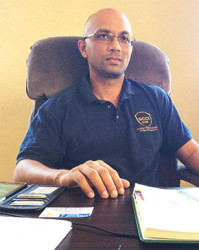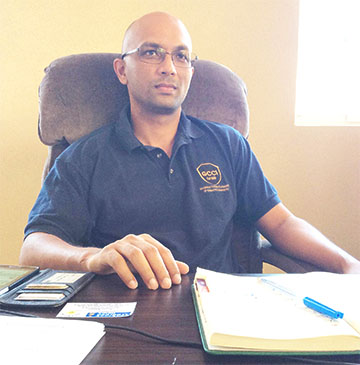Newly elected President of the Georgetown Chamber of Commerce and Industry (GCCI) Vishnu Doerga has told the Stabroek Business that effective collaboration between government and private sector in the quest to take the country’s economy forward continues to be affected by the fact that the private sector is “the other half” of an unequal partnership.
“The truth of the matter is that we are not an equal partner. Government is what it is; a complete organization with all of the necessary resources that goes along with that. The private sector support organization comprises a volunteer organization with all of its limitations,” he said.

Vishnu Doerga
Noting that business support organizations continually find themselves in situations where, as people who serve on their own time, they must “sit across the table” with individuals who represent not only governments but donor agencies and internal organizations, Doerga said that the way forward was for the private sector to make a concerted move to increase the resources available to the business support bodies.
The view articulated by the new Chamber President is effectively a lobby for a significant increase in the membership of local business support organizations (BSOs), specifically the Georgetown Chamber of Commerce in his case.
“Currently, if you add all of the private sector organizations in the county of Demerara together the Chamber operates with less than 1 per cent of the active, legally registered businesses. Out of around 18,000 plus such businesses, we have a membership of just around 160. That is less than 1 per cent. When it comes to all of the private sector organizations the membership is less than 5 per cent of private sector community. The problem is that we have to serve as a voice and as a lobby and to pursue private sector development for the entire private sector but we only have access to, at best, a small percentage of the resources,” Doerga told Stabroek Business.
And having made this analysis, Doerga, a professional business coach, told this newspaper that he believes the capacity of the Chamber can only be increased through increased membership. “What is interesting is that we have arrived at a point where it is entirely affordable for businesses to become members of the Chamber. Beyond that, the Chamber has grown to a point where there are manifest and significant benefits to be had through membership of the organization.” Doerga said. Membership fees for the organization range from $12,000 for small businesses to $100,000 for large businesses. “That works out to $33 per day for small businesses and $274 per day for big businesses,” he added. Asserting that it would be well-nigh impossible for businesses to get a better deal Doerga told Stabroek Business that potential members might wish to take account of the fact that the Chamber had both refined its operations and increased the range of its services in recent years. “Membership offers, among other things, advertising and networking opportunities, potentially profitable business linkages, opportunities for training and for international exposure as well as access to valuable information on an upgraded website. Beyond that we have started to look at international membership and already have two members – Fujitsu and Price Waterhouse – out of Trinidad and Tobago. Of course, beyond that, when we engage and lobby government, our lobby is not for the one per cent that we represent but for the entire business community.
Paying tribute to the work of his predecessor, Doerga said he was satisfied that he had assumed the leadership of a Georgetown Chamber that had established itself as a leader among BSOs. In asserting that the Chamber had acted on the challenges that its members were facing he said that the sustained focus on business growth probably meant that businesses will never really be entirely satisfied. “The truth is that we will always be feeling that there is room for improvement.” And Doerga paid tribute to the work of both the Chamber and the Guyana Manufacturers and Services Association in what he said was a robust lobby that saw the announcement in the 2016 budget of the complete removal of Value Added Tax on packaging. “While the VAT was refundable there is the problem of the time it took to secure the refund. That was hampering our exporters significantly and part of our responsibility as a Chamber is to remove obstacles to the smoothness of their operations,” he said.
Addressing some of what he envisages to be the priorities of the Chamber this year Doerga said that part of the focus would be on supportive partnering with outlying Chambers. “Many of them are unable to deliver significantly on their mandate. We will be looking at creating a place for them in our membership structure and developing the kind of collaborative framework that would help them to benefit from our experience and our resources.”





